#Freight Invoice Auditing
Explore tagged Tumblr posts
Text
Freight Invoicing Software

Freight invoicing software revolutionizes the logistics industry by streamlining and automating the complex invoicing process. This advanced technology simplifies the billing process for freight forwarders, carriers, and shippers, saving time and reducing errors. With features like automated data entry, accurate rate calculation, and invoice generation, the software ensures efficient and accurate billing. It integrates seamlessly with transportation management systems, ERP software, and financial systems, enabling smooth data flow and improved visibility. Additionally, it provides real-time tracking of invoices, facilitates payment reconciliation, and generates detailed reports for analysis and audit purposes.
Overall, freight invoicing software enhances operational efficiency, reduces costs, and improves customer satisfaction in the logistics ecosystem.
0 notes
Text
Cargo to Bangladesh from the UK: What a Decade in Logistics Taught Me
Ten years ago, I booked my first UK-to-Bangladesh shipment—a simple pallet of textile samples.
What followed was a crash course in customs clearance, lost paperwork, and port congestion.
Today, I help UK businesses ship cargo to Bangladesh without the chaos.
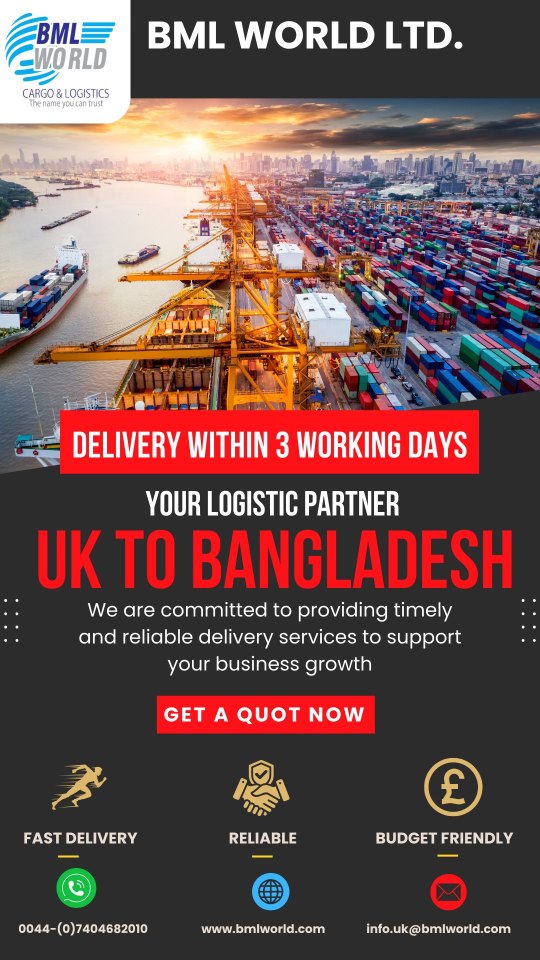
Whether you're moving containers of machinery or eCommerce parcels, this guide unpacks the real-world strategies behind successful UK–BD shipping.
🌍 Why UK-to-Bangladesh Cargo Is Booming
Trade between the UK and Bangladesh is growing rapidly—driven by:
Bangladesh’s booming textile and RMG sector
A large Bangladeshi diaspora in the UK
Increasing demand for British-made goods in Dhaka and beyond
In 2023 alone, UK exports to Bangladesh were valued at over £1 billion.
But behind those numbers is a complex supply chain that can either run like clockwork—or cost you thousands.
🚢 Shipping Routes: Sea or Air?
The UK offers several outbound shipping hubs—Felixstowe, Southampton, London Gateway—while inbound, Chittagong Port handles over 90% of Bangladesh's maritime imports.
Sea Freight
Transit time: 25–35 days
Ideal for: Bulk shipments, non-urgent goods
Ports used: Felixstowe (UK) → Chittagong (BD)
Air Freight
Transit time: 4–7 days
Best for: Urgent, high-value, or perishable goods
Airports: London Heathrow → Dhaka Hazrat Shahjalal Int’l
🔍 Example: A UK skincare brand we work with uses air freight for their initial product drops, then switches to sea once sales patterns stabilize.
📄 Don’t Let Paperwork Delay You
One of the most common causes of delay? Incorrect or missing documentation.
Key documents include:
Commercial invoice (with correct HS codes)
Packing list
Bill of lading or air waybill
Certificate of origin (for duty reductions)
EORI number (for UK exports)
💡 Tip: Double-check Bangladesh's latest import requirements. They change more often than you think.
⚠️ What Most UK Exporters Get Wrong
After working with dozens of UK-based exporters, here are the biggest mistakes I’ve seen:
1. Underestimating Bangladesh's customs process
It’s not just about forms. It’s about knowing what the customs officers actually look for.
Solution: Work with a local clearing agent familiar with port-specific protocols.
2. Relying on generic freight forwarders
Not every freight provider understands UK–BD routes.
Solution: Use a forwarder who’s handled Bangladesh cargo—preferably one with offices in both regions.
3. Ignoring seasonal slowdowns
Eid, Ramadan, and even monsoon season can stall your shipments.
Solution: Build buffer time into your shipping calendar.
📦 Case Study: From Birmingham to Dhaka—How One UK Retailer Scaled Efficiently
A Midlands-based clothing retailer was spending 20% over budget shipping monthly via air.
After a full logistics audit, we transitioned them to consolidated sea freight with pre-cleared documentation.
Result:
27% cost reduction
Reduced customs delays by 80%
On-time delivery rate jumped from 67% to 95%
They now ship over 3,000 units a month to Bangladesh—smoothly.
📌 Best Practices for Smooth Cargo to Bangladesh from UK
Here’s a quick checklist I share with every new client:
✅ Choose the right freight mode for your volume and timing ✅ Work with a UK-based forwarder who partners with BD clearing agents ✅ Use digital tracking tools like CargoWise or SeaRates ✅ Be proactive during Bangladesh’s busy trade seasons ✅ Secure cargo insurance—monsoon damage isn’t uncommon ✅ Stay updated with post-Brexit export changes
📈 Final Thoughts: Smart Logistics = Better Business
Shipping cargo to Bangladesh from the UK is a high-potential move—but only if done right.
It’s not just about moving goods. It’s about building trust, protecting margins, and staying agile in a volatile market.
After a decade in the trenches, I can say with confidence: the exporters who win are the ones who plan smarter, not just ship faster.
As the UK–Bangladesh trade lane continues to grow, exporters must also stay ahead of regulatory changes, especially post-Brexit export documentation and Bangladesh’s shifting import policies. Ignorance isn't just costly—it’s avoidable with proactive compliance monitoring and relationship building with government trade bodies.
In a trade landscape full of volatility and hidden inefficiencies, your logistics strategy must be as dynamic as your market ambitions. Whether you're shipping garments, electronics, or luxury skincare, the message is clear: shipping smart is no longer optional—it's your leverage. When done right, shipping isn't just about cargo. It’s about credibility, customer satisfaction, and long-term scalability in one of South Asia’s fastest-growing markets.
2 notes
·
View notes
Text
Efficient Transportation Management in Logistics in India by Everfast Freight
Transportation Management in Logistics in India by Everfast Freight In today’s fast-paced global economy, transportation management plays a pivotal role in ensuring the smooth flow of goods across geographies. In a vast and diverse country like India, where infrastructure and regional differences pose unique challenges, having an efficient transportation management system is crucial for logistics success. This is where Everfast Freight, a trusted name in the logistics industry, delivers unmatched value.
What is Transportation Management in Logistics? Transportation management refers to the planning, execution, and optimization of the movement of goods. It involves everything from selecting the right mode of transport to route planning, freight auditing, carrier management, and real-time tracking. A robust transportation management system (TMS) ensures timely deliveries, cost efficiency, and enhanced customer satisfaction.
Why Transportation Management Matters in Indian Logistics India's logistics sector is rapidly evolving, with increasing demands for faster deliveries, better inventory control, and cost-effective distribution. Some key challenges in India include:
Infrastructural disparities between regions
Traffic congestion and route optimization issues
Compliance with state-specific transport regulations
Rising fuel and freight costs
Overcoming these requires smart, tech-enabled transportation strategies — exactly what Everfast Freight specializes in.
Transportation Management Solutions by Everfast Freight As one of the leading logistics companies in India, Everfast Freight offers end-to-end transportation management solutions tailored to the dynamic needs of modern businesses. Their services include:
Multi-modal Transport Solutions Whether it’s road, air, or sea, Everfast Freight provides optimized transportation based on your cargo’s requirements and delivery timelines.
Real-Time Shipment Tracking Get complete visibility of your shipments with advanced GPS-enabled tracking systems that provide live updates and reduce uncertainties.
Route Planning and Optimization Efficient route planning minimizes delivery times and reduces fuel costs. Everfast uses advanced tools to select the most cost-effective and time-efficient routes.
Carrier Management From selecting reliable carriers to negotiating rates and managing relationships, Everfast handles the entire carrier ecosystem for you.
Freight Billing and Audit Ensure transparency and accuracy in freight invoicing with automated billing and audit processes.
Industries Served Everfast Freight supports a wide range of sectors, including:
E-commerce
Retail & FMCG
Automotive
Pharmaceuticals
Manufacturing
Import/Export Businesses
Benefits of Choosing Everfast Freight ✅ End-to-End Transportation Management ✅ Reduced Transit Times & Lower Freight Costs ✅ Enhanced Supply Chain Visibility ✅ Scalable Solutions for Growing Businesses ✅ Compliance with Indian Transport Regulations ✅ 24/7 Customer Support
Conclusion In the competitive world of logistics, transportation management is not just about moving goods—it's about moving them smartly, swiftly, and securely. With its deep industry expertise and commitment to innovation, Everfast Freight is helping businesses across India streamline their logistics operations and boost supply chain efficiency.
If you're looking for reliable transportation management in logistics in India, trust Everfast Freight to deliver excellence at every mile.
#logistics#shipping#transportation#cargo services#air cargo#cargo shipping#freightforwarding#custom-clearance#sea freight
1 note
·
View note
Text
Transportation Management System
Navigating Efficiency: The Benefits of a Transport Management System (TMS)
In an increasingly globalized and fast-paced world, effective transportation is key to business success. Companies are constantly seeking ways to streamline operations, reduce costs, and improve service quality. Enter the Transport Management System (TMS)—a software solution designed to optimize transportation logistics. We’ll explore what a TMS is, how it benefits businesses, and why investing in a TMS might be one of the smartest moves you make for your supply chain.
What is a Transport Management System?
A Transport Management System (TMS) is a specialized software solution used to plan, execute, and optimize the movement of goods. It provides a comprehensive platform to manage transportation processes, including route planning, carrier management, shipment tracking, and freight payment. By integrating with other supply chain systems, a TMS offers a centralized hub for managing logistics operations and improving overall efficiency.
Key Features of a TMS
Route Optimization:
The features of a TMS are its ability to optimize routes. By analyzing factors such as traffic conditions, weather, and delivery windows, a TMS helps businesses select the most efficient routes, reducing transportation costs and delivery times.
Carrier Management:
A TMS simplifies the process of selecting and managing carriers. It provides access to a database of carriers, allows for rate comparisons, and facilitates carrier negotiations. This feature ensures that businesses can choose the best carriers based on cost, service quality, and performance metrics.
Real-Time Tracking:
With real-time tracking capabilities, a TMS allows businesses to monitor shipments as they move through the supply chain. This visibility helps in proactively addressing any issues that arise, such as delays or disruptions, and provides customers with accurate delivery estimates.
Freight Audit and Payment:
A TMS automates the freight audit and payment process, ensuring that invoices are accurate, and payments are processed efficiently. This helps in identifying discrepancies, reducing billing errors, and managing transportation costs effectively.
Reporting and Analytics:
Advanced reporting and analytics tools within a TMS provide valuable insights into transportation performance. Businesses can analyze key metrics such as delivery times, costs, and carrier performance to make data-driven decisions and improve operational efficiency.
Benefits of Implementing a TMS
Cost Reduction:
A TMS helps businesses reduce transportation costs through route optimization, carrier management, and efficient freight auditing. By streamlining these processes, companies can achieve significant savings on fuel, labor, and other transportation-related expenses.
Improved Efficiency:
By automating routine tasks and providing real-time visibility, a TMS enhances operational efficiency. Businesses can reduce manual paperwork, minimize errors, and speed up the decision-making process, leading to smoother and more efficient logistics operations.
Enhanced Customer Service:
With real-time tracking and accurate delivery estimates, a TMS improves customer satisfaction. Customers can receive timely updates on their shipments, leading to greater transparency and trust in the delivery process.
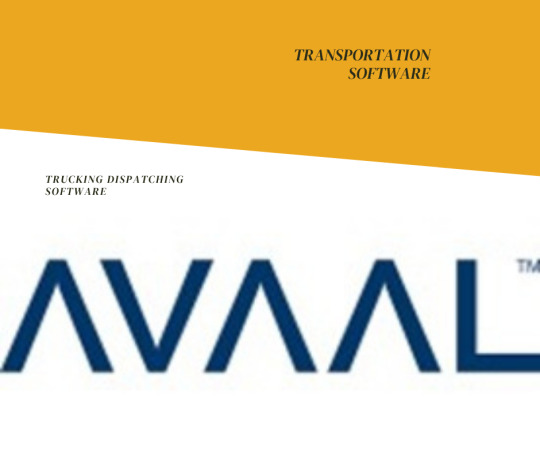
Better Decision-Making:
The data and insights provided by a TMS enable businesses to make informed decisions. Analyzing transportation performance and cost data helps in identifying areas for improvement, optimizing supply chain strategies, and enhancing overall operational performance.
Scalability and Flexibility:
A TMS is designed to scale with your business. Whether you’re expanding operations, adding new transportation modes, or entering new markets, a TMS can adapt to changing needs and support growth.
Choose Right TMS of Your Business
When selecting a TMS, it’s important to consider your specific needs and objectives. Look for a system that aligns with your business size, industry requirements, and budget. Key factors to evaluate include ease of integration with existing systems, user-friendliness, customer support, and the scalability of the solution.
The Future of TMS
As technology continues to evolve, the future of TMS is bright. Innovations such as artificial intelligence, machine learning, and blockchain are set to further enhance the capabilities of TMS. These advancements promise to offer even greater efficiency, accuracy, and security in transportation management.
Conclusion
A Transport Management System (TMS) is a powerful tool that can transform transportation logistics, delivering substantial benefits in terms of cost savings, efficiency, and customer satisfaction. By leveraging the advanced features and capabilities of a TMS, businesses can navigate the complexities of modern supply chains with greater ease and confidence. Investing in a TMS is not just about keeping up with industry trends it's about staying ahead and achieving operational excellence in a competitive market.
2 notes
·
View notes
Text
How EDI Tracking Enhances Supply Chain Efficiency
What is EDI Tracking and How Does It Work in the Supply Chain?
Track your freight with EDI tracking. EDI stands for Electronic Data Interchange Tracking, and it allows companies to track their shipments, inventory, and other business transactions in real time. Unlike the old tracking methods done over the phone, through emails, or manually, EDI automatically manages all the logistics data from suppliers, manufacturers, transporters, and even retail stores.
Automation through EDI tracking also reduces the number of errors in the processing stage, improves the accuracy of predicting the events in a supply chain, and speeds up daily transactions. Businesses that implement an EDI tracking system can improve the speed of order processing by 50%.
The Role of EDI in Freight Tracking and Management
Freight management is a very tough part of a supply chain, as it normally involves many delays, poor communication, and other inefficiencies. One of the newest advanced features is EDI freight tracking, which allows for real-time tracking of shipments, auto-generating status alerts, and ensuring proper delivery confirmation.
With EDI, companies can:
Track shipments at all stages.
Receive notifications about potential delays or changes in routes.
Improve planning and logistics.
Make certain that all the regulations are complied with.
How EDI Tracking Improves Order Processing Efficiency
The old way of handling orders, which includes approving them manually, not entirely documenting them, and miscommunication, is bound to cause delays in order processing. One great way to solve this is through EDI. EDI tracking automates confirmations, invoicing, and shipment status updates.
Commands done automatically reduce the chances of miscommunication, which increases productivity.
Payment processing is also enhanced, which helps reduce disputes.
Real-time inventory checks help maintain the necessary levels of stock.
Companies integrating EDI tracking into their order management systems claim that the accuracy, speed of fulfillment, and supplier coordination have improved tremendously.
EDI Tracking and its Effect on Logistics and Freight Visibility.
Logistics has one inherent problem differentiating it from other fields: not having up-to-the-minute information about freight movement. EDI tracking tackles this issue by providing comprehensive shipment information, including current locations, estimation of delivery times, and delays, if any.
Logistics managers now have the chance to work towards greater accuracy thanks to the enhanced visibility:
Secondary records can be maintained for ease when dealing with compliance and auditing.
Freight data can be used to improve warehouse workflow.
Blocked transportation can speed up and solve delays.
The Benefits of EDI Tracking in Supply Chain Operations
EDI tracking aids in numerous areas, leading to reduced operation costs and higher productivity. These include but are not limited to:
Providing updates for documents keeps trade flowing as there is no downtime.
Less human interference with data entry keeps precision high.
Commands are executed, resulting in an effective and factual balance between stock and market demand.
Reduce costs associated with paperwork and operations through automation.
Standardized communication enhances collaborative efforts with suppliers.
EDI Freight Tracking: Enhancing Transparency and Real-Time Updates
Traditional tracking methods rely on manual updates for information provided through a medium usually not integrated systematically. This makes exception handling very difficult. EDI tracking provides visibility by allowing all suppliers, transporters, and warehouse staff to access real-time transportation information, guaranteeing accuracy.
This leads to:
Immediate access to information on the current shipment status.
Automatic alerts concerning delivery status or route alterations.
Increased responsiveness to supply chain interruptions.
EDI tracking improves delivery schedules and inventory control in retail, healthcare, and manufacturing industries and minimizes supply chain risks.
Best Practices for Implementing EDI Tracking in Supply Chains
To optimally utilize EDI tracking, companies should observe the following recommendations:
Ensure it operates properly within your existing supply chain management systems.
Promote effortless communication amongst all supply chain participants.
Assist in the EDI process amongst organizational staff for proper adoption.
Regularly improve the tracking systems to enhance efficiency.
Create provisions to protect sensitive shipment information and follow set regulations to ensure compliance.
How EDI Tracking Contributes to Improved Supply Chain Efficiency
EDI tracking optimizes supply chain efficiency by reducing manual work, automating progress updates, and providing extensive information in real time. Businesses that utilize EDI tracking gain:
Quicker shipment handling and lower lead times
Improved demand forecasting via real-time inventory telemetry
Automated container tracking notifications for optimal supply chain slack resource coordination
Greater transparency, which improves decision-making
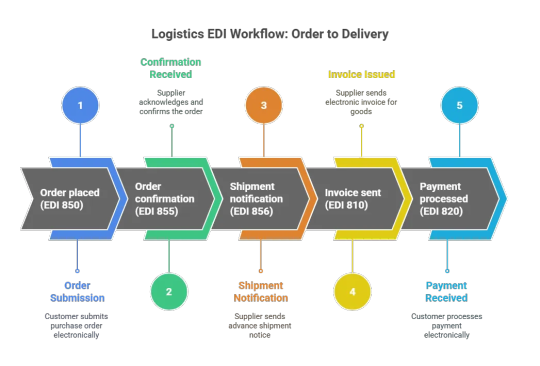
EDI Tracking vs. Traditional Tracking Methods in Supply Chain
The following comparison shows the differences between EDI tracking and traditional tracking methods:
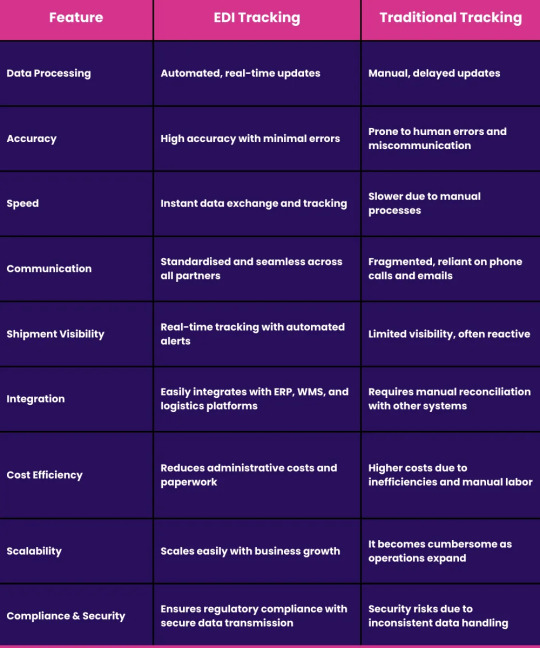
Future of EDI Tracking in Enhancing Supply Chain Management
The future of EDI tracking lies in its use with emerging technologies such as AI, IoT, and blockchain. Businesses are currently utilizing:
AI-driven shipment predictive analytics for improved shipment forecasting.
IoT cargo positioning sensors for real-time monitoring of cargo conditions.
Blockchain for profitable and counterfeit-safe trade document verification.
As these supply chains advance, EDI tracking will become increasingly vital in the precision, speed, and adaptability of global trade.
Final Thoughts: Why EDI Tracking is Essential for Modern Supply Chains
A supply chain needs efficiency, precision, and visibility to be successful. EDI tracking is a necessity rather than an option for companies looking to streamline logistics, reduce costs, and improve engagements with partners.
Firms that use EDI for freight tracking benefit from potential shipment tracking, lower processing errors, and better adherence to trade regulations. These factors contribute to a more agile and responsive supply chain, enhancing its efficiency and ultimately increasing an organization's control over changing market conditions.
XLNC Technologies has focused on advanced EDI tracking technologies designed to assist companies in effectively managing their supply chains and improving third-party logistics.
Improve your operational effectiveness and enhance your supply chain visibility with XLNC Technologies today.
Frequently Asked Questions:
What is EDI tracking, and how does it benefit supply chain efficiency?
EDI tracking follows the flow of information between the different stages of the supply chain. It tracks every action taken to process an electronic data interchange submission and enables active manipulation of that information. The model for data monitoring proposed by the EDI tracking process considerably improves the efficiency of the supply chain.
How does EDI freight tracking improve visibility and management?
Freight tracking by EDI (Electronic Data Interchange) is an automated reminder system of a shipment's status that encompasses an entire shipment and provides updates in real time, leading to route optimization. It allows one to understand freight movement better, which helps in forecasting delays, efficient logistics control, and overall management of the supply chain.
What role does EDI play in order processing and logistics?
With EDI, order confirmation, invoice tracking, and delivery tracking are automated. This entails less document filling out, reduced manual data entry, increased accuracy, and minimised human error. Streamlining and smoothing the process promotes speedy transactions, optimizes inventory control, and causes uninterrupted engagement and coordination among the players in the supply chain, which accelerates order delivery.
What are the advantages of using EDI tracking over traditional tracking methods?
Unlike traditional tracking, where updates are manually made or sent through emails, EDI tracking offers automated and instantaneous updates that are more accurate than other means. It also decreases paperwork and delays and can be easily integrated with logistics systems to improve overall responsiveness and efficiency.
How can businesses implement EDI tracking in their supply chains?
For business purposes, EDI tracking can be done by picking the right EDI system, connecting it to the logistics and ERP software package(s), setting up a data hierarchy, teaching staff how to handle data and follow the rules, standardizing the exchange formats, and keeping track of the performance metrics that matter to make business processes run more smoothly.
0 notes
Text
All-in-One Freight Forwarding Software
All-in-One Freight Forwarding Software
With QuickMove's freight management software, you can centralize your entire logistics workflow into one smart system. No more switching between spreadsheets, emails, and outdated tools.
Here’s how we solve your biggest pain points:
Automated Documentation: Generate invoices, packing lists, and shipping instructions in a click.
Real-Time Shipment Tracking: Get live updates across air, sea, and land freight.
Integrated CRM & Communication: Keep client conversations, bookings, and job updates in one place.
Compliance & Customs Support: Stay audit-ready and manage international regulations with ease.
Cloud-Based Access: Manage your freight business with Quickmove Freight Software from anywhere — office, port, or on the go.
Ready to Simplify Your Freight Forwarding Operations?
Empower your team. Delight your customers. Scale your freight business with confidence.
#logistics software#freight software#software for freight forwarding software#freight forwarding software#warehouse management system#freight forwarding system#warehouse software#freight forwarder software#freight logistics software#wms
1 note
·
View note
Text
What is an Importer of Record? Roles, Obligations, And Prison Necessities Defined
In the international of global change, the time period Importer of record (IOR) plays a critical position in ensuring clean and legal motion of products across borders. If you're coping with international shipping or logistics, expertise what an Importer of Record is and why it matters is essential. On this guide, we’ll explore the definition, responsibilities, and prison obligations of an IOR and how professional services like One Union solutions can simplify this complicated manner.
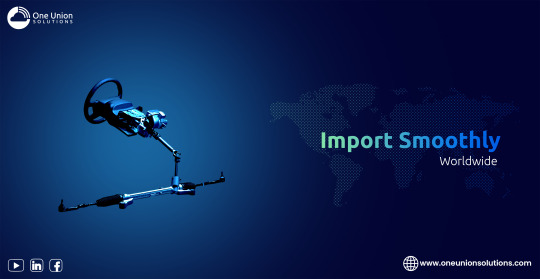
What Does “Importer of Record” Imply?
The Importer of Record (IOR) is the entity or individual chargeable for ensuring that imported goods observe local legal guidelines and regulations. This includes proper Recordation, fee of obligations and taxes, and ensuring customs clearance. The IOR is legally accountable for the shipment from the moment it enters a rustic.
In easy terms, the Importer of Record is the felony owner or exact celebration who takes responsibility for the importation procedure.
Key Responsibilities of An Importer of Record
Appearing as an Importer of Record comes with huge duties. Here are the number one duties:
1. Customs Compliance
The IOR have to make sure that each one goods meet the import policies of the destination u . S . A .. This includes correct category of goods, valuation, and starting place assertion.
2. Recordation Control
The IOR is accountable for supplying and keeping all vital office work, inclusive of:
Business invoices
Packing lists
Import licenses
Certificate of beginning
Bills of lading
Those Records ought to be accurate, entire, and compliant with the customs authorities.
3. Payment Of Responsibilities and Taxes
An Importer of Record is chargeable for paying all required customs responsibilities, VAT/GST, and any other relevant prices. Failure to do so can bring about delays, fines, or seizure of goods.
4. Record-keeping
Customs authorities require importers to hold specific information of all shipments for a certain length—frequently among five to 7 years. The IOR should make sure comfy and prepared garage of those statistics.
5. Product Compliance
The goods being imported have to follow nearby standards and policies (e.G., safety certifications, labelling necessities, and environmental requirements). The IOR ensures this compliance.
Who Can Act as an Importer of Record?
The Importer of Record can be:
The actual patron or consignee of the products
A freight forwarder or logistics provider
A 3rd party IOR carrier provider like One Union solutions
In many instances, particularly with foreign agencies uploading into international locations like the America, United Kingdom, or India, groups hire IOR provider companies to behave on their behalf. That is regularly vital when the foreign entity doesn’t have a felony presence in the destination country.
Criminal Requirements for An Importer of Record
Being an IOR entails prison responsibilities under customs law. Those consist of:
Registering with customs authorities (such as obtaining an importer range or EORI)
Understanding and complying with nearby trade legal guidelines
Submitting accurate import declarations
Responding to audits or customs inspections
Failure to conform can result in hefty consequences, revocation of import rights, and harm to business organisation recognition.
Benefits of Hiring a professional IOR provider
Given the complexity, many businesses outsource this characteristic to specialists. Here’s how a enterprise like One Union solutions facilitates:
Quit-to-end compliance control
Actual-time updates and Record monitoring
Customs filing and tax payment assistance
Skilled support for navigating import challenges
The usage of a reliable Importer of Record service eliminates the danger of non-compliance and guarantees that items reach their destination legally and on time.
Why One Union Solutions?
One Union solutions specialize in international IOR services throughout a couple of international locations. We cope with:
Complicated import rules
Recordation and submitting
Fee of obligations and taxes
Compliance across industries (IT hardware, clinical devices, telecom, and extra)
With One Union solutions, agencies can awareness on increase while we manipulate the returned-cease import technique seamlessly.
Final Mind
The Importer of Record performs a pivotal position in ensuring that global shipments are legally compliant and effectively managed. Whether or not you are a small agency increasing globally or a multinational getting into new markets, expertise the obligations and requirements of an IOR is essential.
By means of partnering with experienced professionals like One Union Solutions, businesses can simplify the method and keep away from steeply-priced delays, penalties, and compliance problems.
#importer of record#foreign importer of record#importer on record usa#importer of record meaning#ior meaning#what is an importer of record
0 notes
Text
Why BPO Services Are Essential for Modern Logistics Operations
The logistics industry is the backbone of global trade, ensuring goods move seamlessly from factories to consumers. But behind every successful delivery is a web of documentation, compliance checks, billing and customer queries. As logistics operations become more complex, many companies are turning to Business Process Outsourcing (BPO) to streamline their workflows and scale faster.
Streamlining Operations Without Expanding Teams
From order processing and shipment documentation to inventory updates and compliance filings, back-office tasks demand accuracy and speed. Logistics companies that outsource these non-core tasks to experienced BPO partners can focus on what matters most: growing their network and serving their customers. At Odak Solutions, we specialize in managing these operational complexities behind the scenes so your frontline team can focus on growth.
Reducing Costs While Improving Quality
Building an in-house back-office team comes with high overheads. Outsourcing to BPO providers in cost-efficient regions allows logistics firms to maintain quality while reducing costs. For example, Odak Solutions has helped clients cut operational costs by up to 40% while maintaining SLA-driven accuracy and turnaround times.
Technology Access Without Heavy Investment
Today’s BPO providers are equipped with the latest tools for automation, data processing and compliance tracking. Odak integrates technologies to ensure your processes are fast, visible and audit-ready, without the need for you to build this tech stack in-house.
Scalability That Matches Market Dynamics
Whether you're facing peak-season shipment surges or off-peak slowdowns, a BPO partner provides the flexibility to scale your operations without the cost and hassle of hiring or layoffs. Odak's teams adapt quickly to volume changes, ensuring business continuity and performance stability.
Better Customer Experience Through Reliable Support
Delays and doc errors impact more than your internal KPIs, they affect your customers. By outsourcing customer support, shipment status tracking and documentation management, logistics firms ensure timely, accurate communication. Odak Solutions' back-office teams act as your extended voice, providing proactive updates that improve customer trust.
Compliance and Risk Management
Freight forwarding, NVOCC operations and cross-border logistics all involve regulatory complexities. Our experts stay updated on customs rules, country-specific requirements and safety protocols, so your documentation and filings remain compliant and audit-proof.
Global Reach with Local Expertise
Odak Solutions supports clients across regions by combining global standards with localized expertise. Whether it’s navigating U.S. import procedures or handling Middle East carrier documentation, our team brings both precision and cultural understanding.
What Makes Odak Different?
Since 2019, Odak Solutions has been the quiet engine powering efficient freight operations for NVOCCs & freight forwarders. We offer:
End-to-end back-office support (BL, pre-alerts, invoices, etc.)
SLA-based delivery models
Tech-enabled workflows
Clients have seen:
Up to 40% cost reduction
24-hour invoicing turnaround
100% pre-check accuracy on documents
Ready to Optimize Your Operations?
Let's talk about how we can support your team behind the scenes, so they can focus on scaling.
Visit: www.odaksolutions.com
0 notes
Text
The Perfect ERP Stack for Logistics & Distribution Companies

In today’s global economy, logistics and distribution are no longer just about moving goods, they’re about orchestrating efficiency, minimizing waste, and maximizing visibility across complex, multi-layered supply chains.
Warehouses must talk to order management. Inventory should update in real-time. Transport delays must trigger instant rerouting. Customers now expect tracking links, not excuses. And all of it must be done faster, smarter, and cheaper.
That’s where an intelligent ERP stack steps in.
The perfect ERP stack for logistics and distribution isn’t a single piece of software, it’s an ecosystem of seamlessly integrated modules designed to deliver end-to-end control, from first mile to last-mile.
In this definitive guide, we break down exactly what your ERP stack needs to deliver competitive edge, real-time intelligence, and customer delight at scale.
The Growing Complexity of Logistics & Distribution
From hyperlocal delivery startups to international freight giants, every logistics company now deals with:
Multichannel order flows
Volatile demand
Fragmented supply chains
Rising customer expectations
Tight delivery SLAs (Service Level Agreements)
Cost pressures and razor-thin margins
And the post-pandemic world hasn’t helped. Disruptions are now a constant. Visibility gaps are costly. Spreadsheets? Obsolete.
Logistics ERP systems need to power:
Real-time coordination
Proactive decision-making
Predictive insights
Seamless collaboration
Why Traditional Systems Are Failing the Industry
Many logistics companies still rely on:
Legacy software with siloed data
Manual coordination across departments
Inflexible tools that can’t scale with new routes or partners
Fragmented warehouse management
Poor integration between customer portals and backend systems
This leads to:
Delays in fulfilment
Inventory mismatches
Routing inefficiencies
Increased operational costs
Unhappy customers
Modern ERP for logistics is the cure.
What Makes an ERP Stack “Perfect” for Logistics
A perfect ERP stack is:
Modular: Adaptable to the size and complexity of your operations
Integrated: Every module shares data — no silos, no sync delays
Scalable: From 1 warehouse to 100, without rebuilding everything
Real-Time: Live updates across inventory, transport, and demand
Cloud-Native: Accessible, flexible, and secure
AI-Powered: Smarter predictions, faster routing, automated alerts
Core Modules Every Logistics ERP Must Include
1.Warehouse Management System (WMS)
Bin-level inventory tracking
Put away optimization
Cycle counting automation
Barcode & RFID integration
2.Transportation Management System (TMS)
Route optimization
Carrier management
Freight audit
Real-time GPS tracking
3.Order Management
Omnichannel order orchestration
Returns handling
Order lifecycle visibility
4.Inventory Management
Stock forecasting
Dead stock alerts
Auto-replenishment
5.Finance & Billing
Automated invoicing
Freight cost reconciliation
Tax compliance
6.Customer Relationship Management (CRM)
Client order history
SLA monitoring
Issue tracking and resolution
Advanced Features to Look For in 2025
AI-based Demand Forecasting
Digital Twins for Warehouses
Autonomous Mobile Robots (AMRs) Integration
Blockchain-enabled Shipment Verification
Voice-enabled Pick-Pack Commands
Cold Chain Monitoring (IoT Sensors)
Carbon Footprint Tracking & Reporting
The future of logistics ERP is intelligent, adaptive, and sustainable.
How Real-Time Data Changes Everything
In logistics, lag equals loss. Real-time ERP platforms provide:
Live inventory updates
ETA recalculations with traffic/weather data
Dynamic re-routing of shipments
Instant alerts on exceptions
Dashboard views of every touchpoint from supplier to customer
Cloud ERP vs. On-Premises: What Works Best?
Cloud ERP is winning, and for good reason:
Lower upfront cost
Faster implementation
Scalable infrastructure
Anywhere access (critical for distributed teams)
Built-in disaster recovery
Seamless updates and AI enhancements
While on-prem may still serve legacy-heavy firms, cloud-native ERP is the future.
Integration with IoT, GPS, and Telematics
Modern ERP stacks thrive on data from connected devices:
IoT sensors track container temperature, humidity, or tilt
GPS integration feeds real-time location into dashboards
Vehicle telematics inform route efficiency and driver behaviour
Smart pallets and tags enhance warehouse throughput
This enables:
Predictive maintenance
Intelligent asset tracking
Shipment anomaly detection
Increased compliance
Warehouse Automation: When ERP Meets Robotics
Smart ERP platforms integrate with:
Conveyor belts and pick robots
AGVs (Automated Guided Vehicles)
AMRs for zone picking
Vision systems for damage detection
The result? → Faster fulfillment → Lower labour dependency → Improved accuracy → 24/7 operations
ERPONE, for instance, supports full robotic orchestration via API-ready architecture.
KPIs to Track with a Smart ERP Stack
OTIF (On-Time, In-Full)
Average Warehouse Throughput
Order Fulfilment Cycle Time
Transport Cost per Mile
Inventory Turnover Rate
Customer SLA Adherence
Returns Ratio
Carbon Emissions per Shipment
ERP dashboards let you track these in real time, empowering instant optimization.
Final Thoughts
The logistics sector is under pressure from consumers, competitors, and climate realities. The winners will be those who:
See what’s happening in real time
Automate what slows them down
Anticipate disruptions
Serve smarter and faster than anyone else
That’s the power of a perfect ERP stack.
It’s not about having more software, it’s about having the right ecosystem: cloud-native, AI-infused, fully integrated, and future-ready.
If your ERP can’t scale with your routes, connect with your assets, and learn from your data, you’re not ready for what’s next.
But with the right stack? You’ll deliver delight at every touchpoint, every time.
0 notes
Text
How Assist Export helps clients maximize export incentives and savings
By Engin Sindel, Assist Export, Türkiye
Talk to any seasoned exporter and they’ll tell you—the margin between a successful export deal and a disappointing one often lies in the details. Not just in the price negotiations or logistics costs, but in how well you navigate the myriad incentives and supports that governments and trade institutions provide. In Türkiye, those incentives are extensive. Generous even. But they’re also layered, sometimes buried in bureaucracy, and, to be candid, not always easy to decode.
That’s where the conversation gets interesting.
At Assist Export, we’ve long believed that documentation and compliance are only part of the value chain. The other part—equally important, arguably more impactful for small and medium-sized exporters—is helping clients identify, apply for, and ultimately secure the benefits they’re entitled to. Because these aren’t bonuses. They’re strategic tools.
Let’s take a simple example. One of our newer clients, a furniture manufacturer based in Bursa, had been exporting consistently to Eastern Europe for over a year. Their business was growing, margins were tight, and they were reinvesting in design and production. What they didn’t realize was that they qualified for government-backed export incentives under the Ministry of Trade’s market entry support program. They just hadn’t applied. Why? Because they didn’t know it existed. Or how it worked.
After a review of their operations, we helped prepare a complete documentation pack—invoices, logistics proofs, certifications, and market reports. It took a few weeks, yes. But within the quarter, they were approved for a partial reimbursement of promotional expenses and a contribution to freight costs. That translated into real savings, which they could then reinvest.
That’s not an outlier. It’s a pattern.
Incentives in Türkiye cover a broad spectrum: export credits, tax reductions, insurance premium supports, R&D assistance, even booth costs for international fairs. But each has its own application cycle, documentation demands, and post-audit requirements. For a business focused on selling and shipping products, keeping up with those cycles isn’t easy. That’s why we integrate it into the advisory side of our service.
Sometimes, it’s as straightforward as explaining eligibility. Other times, it involves rethinking how a company structures its export pricing to reflect potential refunds or rebates. And occasionally, we advise clients to hold off on a specific incentive application if it conflicts with a longer-term objective. It’s not about chasing every lira of savings. It’s about making each lira work smarter.
Another layer to this is compliance. Government incentive schemes come with strings attached—rightfully so. Funds disbursed must be justified, timelines respected, and reporting accurate. We once worked with a tech exporter that was penalized due to an incorrectly coded customs declaration. The actual shipment was valid, but the paperwork misalignment triggered an audit delay. These things happen. But they can also be avoided.
And then, of course, there’s the bigger picture. As exporters navigate more competitive global environments, incentives are not just financial cushions. They’re positioning levers. Being able to reduce costs in one area can allow for better flexibility in pricing or more investment in market expansion.
This ability to look beyond the immediate transaction is something we’re constantly refining. It’s also why we’re proud to share that Assist Export, based in Türkiye, has been nominated for the 2025 Go Global Awards. The event, hosted by the International Trade Council this November 18–19 in London, isn’t just about applause. It’s a gathering of like-minded businesses looking beyond borders. It’s where new connections are made, methods are challenged, and future ideas are planted. Being a part of it reaffirms what we’ve always believed: that exporting is not a solo effort. It’s a shared endeavor built on trust, expertise, and a willingness to dig deeper.
So, if you’re an exporter in Türkiye trying to stretch your margins, grow your presence, or simply make sense of the incentive maze—know this: there are resources available. There are savings to be unlocked. Sometimes the key is just asking the right questions.
#ExportIncentives#TurkeyTrade#AssistExport#ExportSavings#SMEsupport#TradeCompliance#GoGlobalAwards#EnginSindel#ExportStrategy#FinancialEfficiency
0 notes
Text
Leading Logistics & Transportation Software in UAE - Dubai
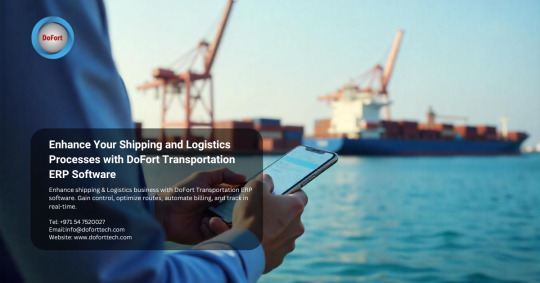
Enhance Your Shipping and Logistics Processes with DoFort Transportation ERP Software
Mastering your shipping, cargo, and transportation is the key to thriving in today's highly competitive logistics environment. Think about it: you've got to track shipments instantly, make the most of your fleet, and stay compliant with all the rules. It's a lot to juggle!
That's exactly where DoFort Transportation Software and Logistics ERP Software step in. They're like your all-in-one smart assistant, bringing together everything you need. They help you transform how you operate by adding automation, giving you clear visibility, and putting you firmly in control. It's about making those constant challenges a whole lot simpler.
What is Logistics ERP Software and Why is It Crucial?
Logistics ERP software is a tailored enterprise resource planning system aimed at centralizing and optimizing all activities associated with logistics, freight management, cargo movement, inventory, warehousing, and transportation. Unlike standard ERP systems, logistics ERP connects transport workflows with financials, customer service, compliance, and analytics to deliver comprehensive visibility and control.
As supply chains grow more complex — featuring various transport modes, international regulations, and heightened customer expectations logistics ERP software becomes an essential asset. It shifts logistics from being a cost center to a competitive edge by facilitating seamless collaboration, smarter decision-making, and real-time responsiveness.
DoFort Transportation Software: Built for End-to-End Optimization
DoFort’s transportation software offers more than just standard ERP features. It serves as a comprehensive digital control tower for your logistics activities — enabling you to oversee, control, and enhance every shipment, route, resource, and stakeholder throughout the supply chain.
Key capabilities include:
Unified dashboard for multimodal transport operations (air, sea, land)
Real-time fleet tracking integrated with IoT & GPS
AI-powered route planning and dynamic rescheduling
Automated freight billing and revenue recognition
Partner, vendor, and customer portals
Embedded analytics and KPI monitoring
Advanced Route Optimization & Fleet Utilization
Route planning has evolved beyond merely selecting the shortest route. It now takes into account fuel efficiency, load optimization, traffic conditions, delivery windows, and driver availability. DoFort’s transportation software leverages AI algorithms for dynamic route optimization — which helps in minimizing delivery times and enhancing vehicle utilization.
Fleet managers are able to oversee performance in real-time, manage maintenance schedules, and get predictive alerts for potential vehicle breakdowns. This forward-thinking strategy not only minimizes downtime but also prolongs the lifespan of your assets while boosting driver safety and compliance.
Integrated Freight Billing, Tariffs & Accounting Automation
Freight billing is among the most error-prone aspects of logistics. DoFort makes this easier with automated tariff calculations that consider weight, distance, cargo type, delivery urgency, and contract rates.
With support for multiple currencies and taxes, the system guarantees precise invoicing for global transactions.
The logistics ERP system integrates smoothly with financial modules, allowing for automatic revenue recognition, expense allocation, audit trails, and profitability analysis by shipment, region, or customer — ensuring transparency and compliance.
Unified Warehouse & Inventory Control
Logistics operations frequently struggle because of mismatched warehouse and inventory systems. DoFort bridges this divide by providing comprehensive inventory tracking across various warehouses, zones, and packaging units.
Regardless of whether goods are in transit, pending customs clearance, or being repackaged for delivery — DoFort’s logistics ERP delivers real-time updates on location, quantity, and status. Its advanced features, including barcode/RFID scanning, cross-docking, and bin-level tracking, promote quicker throughput, fewer errors, and improved operational control.
Multi-Modal Transport Support: Land, Sea, Air, Rail
Contemporary logistics encompasses intricate operations involving various carriers and regions. DoFort’s logistics ERP software facilitates multi-modal shipping, allowing companies to manage road transport, seaport activities, freight forwarding, and air cargo operations — all within a single platform.
Equipped with compliance features and documentation templates (such as airway bills, cargo manifests, and customs forms), you can streamline cross-border shipping while complying with international trade laws and standards.
Real-Time Dashboards, KPIs & Predictive Analytics
Data has become the new oil in the logistics industry. DoFort provides logistics managers with sophisticated dashboards and predictive analytics that reveal important insights — including delivery performance, route efficiency, cost-per-shipment, fuel usage, and customer satisfaction ratings.
Decision-makers can utilize AI-driven forecasting to handle peak demands, prevent bottlenecks, and enhance operations. Role-based access guarantees that each stakeholder views the data that is most pertinent to their role.
Secure, Cloud-Ready & Scalable Architecture
DoFort ERP operates on a contemporary, secure cloud framework that ensures both scalability and high performance.
With its multi-tenant architecture and flexible deployment choices, companies can begin with essential logistics modules and later grow into HR, CRM, or procurement as required.
Security is integrated at all levels — featuring encrypted data transmission, multi-factor authentication, and user-role permissions.
Whether you are a mid-sized cargo company or a worldwide 3PL provider, DoFort adapts to your business journey.
Final Thoughts: Logistics ERP Software for the Future of Transportation
The worldwide logistics and transportation sector is stepping into a new age — propelled by digital advancements, immediate expectations, and performance based on data. To succeed in this landscape, companies need to adopt smart systems that automate, integrate, and enhance operations on a large scale.
DoFort Logistics ERP Software and Transportation Software are specifically designed for this future — providing you with the control, flexibility, and insights necessary to function at maximum efficiency while pleasing your customers. Now is the moment to digitize your logistics. Now is the moment to select DoFort.
#logistics software#logistics ERP software#Logistics ERP system#ERP software for logistics#transportation software#transportation ERP software#Transportation ERP system#transportation management software#TMS software#Logistics management software
0 notes
Text
Exporting From Australia To USA: A Complete Guide
If you're planning on exporting from Australia to USA, there are essential steps and regulations you need to follow. Here’s a simplified checklist:
1. Get an ABN (Australian Business Number) Required for Australian exporters to register and operate legally.
2. Apply for an Exporter Identification Number (if needed) Certain goods may require registration with Australian or U.S. authorities.
3. Classify Your Goods Use the correct HS and HTS codes to meet export and import requirements.
4. Understand U.S. Import Regulations Ensure your products comply with U.S. agencies like FDA, USDA, or EPA depending on the goods.
5. Prepare a Commercial Invoice Include product details, value, origin, and buyer information clearly.
6. Use a Freight Forwarder or Customs Broker They assist with logistics, U.S. customs filings, and paperwork compliance.
7. Submit Export Declarations Lodge through Australia’s Integrated Cargo System (ICS) if required.
8. Arrange Shipping and Insurance Select reliable carriers and insure your goods for safety and peace of mind.
9. Comply With Labeling & Packaging Standards Make sure your products meet U.S. labeling and safety packaging rules.
10. Keep All Trade Documents Maintain records of shipments for future audits or dispute resolution.
Understanding the process of exporting from Australia to USA helps ensure smooth delivery, legal compliance, and fewer customs delays.
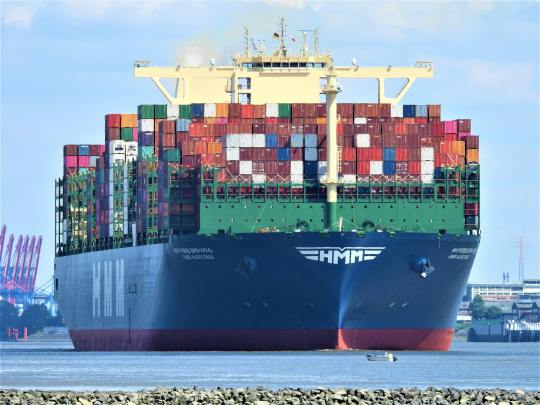
0 notes
Text
Freight Bill Processing Services for Freight Forwarders in the USA
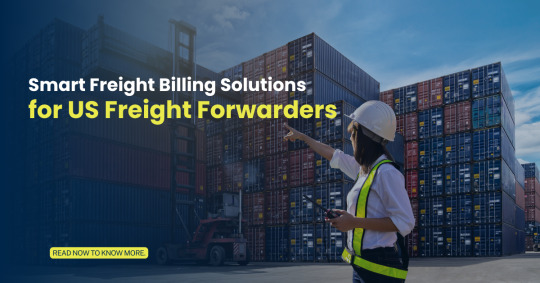
In the fast-moving world of logistics and transportation, freight forwarders face mounting pressure to streamline operations, reduce errors, and improve turnaround times. One area where this pressure is most evident is freight bill processing—a task that, while critical, is often time-consuming and prone to costly mistakes.
As freight volumes grow and regulatory compliance becomes increasingly complex, more freight forwarders in the USA are outsourcing this function to the best freight bill processing companies. By doing so, they’re not only optimizing operations but also gaining a competitive edge in the market.
What Is Freight Bill Processing?
Freight bill processing involves auditing, validating, and paying freight bills generated by carriers or third-party logistics providers. It includes tasks like:
Verifying shipment details
Matching bills of lading with invoices
Validating rates and tariffs
Detecting discrepancies and overcharges
Managing payment workflows
Generating financial reports
In a manual or semi-digital environment, these processes can be resource-intensive and error-prone. That’s where professional freight bill processing services make a difference.
Why Freight Forwarders Are Turning to Outsourcing
1. Enhanced Accuracy and Compliance
Outsourcing to the top freight bill processing company in USA ensures bills are validated against pre-approved rate agreements, accessorial charges, and delivery receipts. This significantly reduces billing errors, overpayments, and compliance issues, which can otherwise lead to financial losses or strained carrier relationships.
2. Faster Turnaround and Scalability
Freight forwarders often deal with peak season surges and fluctuating volumes. Outsourced partners offer the scalability needed to handle large volumes of invoices quickly and efficiently—ensuring your operations never slow down.
3. Real-Time Visibility and Reporting
Today’s best logistics freight bill processing companies in the US provide tech-enabled platforms that offer real-time visibility into billing status, dispute resolutions, and financial metrics. This helps businesses make data-driven decisions and improve cost control.
Key Benefits for Freight Forwarders
Reduced Operational Costs: Lower overhead by eliminating in-house teams or redundant systems
Increased Productivity: Allow internal teams to focus on customer service and core logistics tasks
Dispute Management: Resolve billing discrepancies quickly to avoid delays in carrier payments
Regulatory Adherence: Stay updated on the latest transport regulations and tax requirements
Audit Readiness: Maintain digital records and trail logs for internal or external audits
Choosing the Right Partner
When selecting a provider, look for a top freight bill processing company in the USA that offers:
Industry expertise in logistics and transportation
Cloud-based platforms for document handling and integration
Secure, SOC-compliant data management
End-to-end support from audit to payment
Some of the best freight bill processing companies are already working with global freight forwarders, helping them save up to 30% in processing costs while improving overall operational efficiency.
Conclusion
In a competitive logistics environment, freight forwarders cannot afford inefficiencies in their back-office processes. Partnering with the best logistics freight bill processing company in the US is more than a cost-saving strategy—it’s a move toward smarter, more agile operations.
Whether you handle regional shipping or global logistics, professional freight bill processing services ensure that your billing workflows are accurate, timely, and audit-ready—so you can focus on moving freight, not chasing invoices.
0 notes
Text
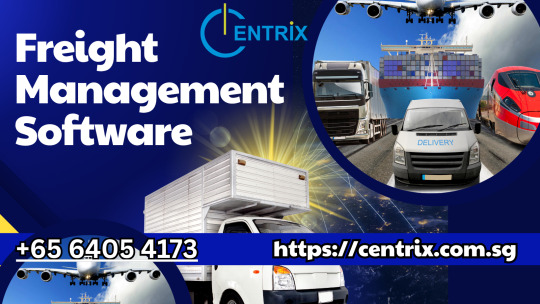
Main Uses of Freight Management Software

Automates carrier selection, route optimization, and booking of freight based on cost, speed, and capacity.

Tracks shipments in real time, giving visibility into the location and status of cargo.

Generates and manages essential shipping documents (BOLs, invoices, customs forms) and helps meet regulatory requirements.

Stores and compares carrier rates and contracts to get the best shipping options and control costs.

Connects shippers, carriers, freight forwarders, and customers on a single platform for updates and problem resolution.

Provides insights into shipping costs, carrier performance, delivery times, and exceptions for better decision-making.

Automates freight billing, invoice matching, and auditing to avoid overcharges and billing errors.
Try a demo
#freight#freightmanagement#freightsoftware#airfreight#seafreight#LandFreight#Singapore#centrixsolutions
0 notes
Text
Why Back‑Office Dispatch Support Makes a Big Difference to Carriers

Introduction
For many carriers, success on the road often depends on what happens behind the scenes. While finding good-paying loads and staying compliant is critical, handling everything from paperwork to broker communication can be overwhelming—especially when you’re trying to do it all yourself. That’s where dispatch back office support plays a huge role.
At MBM Dispatching, we’ve seen firsthand how strong back-office support can transform a carrier’s operations. It’s not just about reducing stress—it’s about helping drivers stay focused, get paid faster, and scale their business with fewer headaches. In this blog, we’ll explore why having a reliable back-office dispatch partner makes such a difference and how MBM supports carriers day in and day out.
What is Back-Office Dispatch Support?
Back-office dispatch support covers all the administrative and coordination tasks that keep your business running smoothly while you're out on the road. This includes managing rate confirmations, submitting paperwork, booking appointments, handling check calls, tracking freight, and communicating with brokers.
For owner-operators and small fleet owners, doing this alone means less time focusing on driving or growing the business. And if anything slips through the cracks—like a missing POD or a delayed invoice—it can delay payments or damage relationships. MBM Dispatching steps in to handle these tasks so carriers can operate with confidence and focus on what they do best: driving and delivering.
Reducing Administrative Burden
Running your own trucking operation means you’re not just a driver—you’re also the accountant, the dispatcher, and the customer service rep. Managing all that can be exhausting, especially after a full day on the road.
By using MBM’s dispatch back office support, carriers offload the paperwork and admin tasks that eat up valuable time. We handle everything from organizing load documents to filing rate confirmations and following up with brokers. This allows you to finish your day without needing to spend hours catching up on clerical work.
Speeding Up Payment Processing
Late payments are one of the biggest challenges carriers face. Often, it’s not that the broker is delaying intentionally—it’s that required paperwork wasn’t submitted properly or on time. One missing document or incorrect invoice can slow down your cash flow significantly.
Our team ensures that every trip is documented correctly and submitted quickly. MBM Dispatching follows up with brokers, verifies payment schedules, and resolves any missing paperwork issues fast. That kind of proactive support helps you get paid faster, avoid disputes, and keep your revenue cycle running smoothly.
Managing Broker Communication Professionally
Not all drivers want to deal with constant broker calls, negotiation updates, or last-minute changes to pickup and delivery times. And in many cases, missing an update can lead to confusion, delays, or fines.
That’s where we step in. At MBM, we take over all broker communication on your behalf. From load confirmation to status updates and problem-solving on the go, we represent your operation professionally. This not only improves relationships with brokers but also allows you to focus on staying safe and efficient behind the wheel.
Keeping Your Documents Organized and Accessible
Lost rate confirmations, unsigned PODs, or outdated insurance certificates can all cause problems—especially when it's time to reconcile loads or prepare for audits. A good dispatch back office system keeps everything where it needs to be.
MBM provides document management that keeps your files clean, digital, and accessible. Whether you need to re-send a BOL to a broker or confirm a previous load’s details, our organized systems make it easy to stay compliant and avoid chaos.
Supporting Business Growth and Scaling
As you grow from one truck to a small fleet, the complexity of your business grows too. Dispatching gets more complicated. Paperwork piles up. And managing everything alone just doesn’t work anymore.
Back-office dispatch support helps you grow without sacrificing control. MBM Dispatching scales with you—we’re equipped to handle dispatch and admin needs for multiple trucks, keeping communication streamlined and ensuring each load is managed with the same attention to detail.
Whether you're growing your fleet or just looking to take weekends off without worrying about paperwork, we’ve got the systems in place to support your goals.
Building Trust Through Reliability
In the trucking world, your reputation is everything. If you miss a load update or delay paperwork too long, brokers may hesitate to work with you again. Consistency and professionalism go a long way in building trust.
At MBM Dispatching, we’ve built long-term broker relationships by representing our carriers reliably and professionally. That trust transfers directly to you. With our support, your operation looks polished, organized, and dependable—even if you're just getting started.
FAQs
What tasks does MBM’s back-office dispatch support include? We handle paperwork, invoicing, broker communication, check calls, rate confirmations, document submissions, and follow-ups for payment. Basically, we take care of all the admin work while you focus on driving.
Do I still have control over my loads? Yes. You’re always in control. We support you by handling the back-end work and providing guidance. You make the final decisions based on your preferences and goals.
Is this service only for larger fleets? No. In fact, owner-operators benefit the most. Whether you run one truck or five, our systems adapt to your needs and grow with your business.
Can MBM help if a broker refuses payment or there’s a load dispute? Yes. We follow up on your behalf, resolve issues, and handle the necessary communication to protect your payments and relationships.
Conclusion
Back-office dispatch support isn’t just a convenience—it’s a key to staying efficient, organized, and profitable as a carrier. From faster payments and cleaner paperwork to fewer headaches and better broker relationships, this behind-the-scenes support creates real, measurable results for your business.
At MBM Dispatching, we treat your business like it’s our own. Our dispatch back office support services are designed to simplify your daily operations, reduce stress, and help you scale without breaking stride. If you're ready to focus more on driving and less on admin work, MBM is here to back you up every mile of the way.
#logistics management#truck dispatch service#dispatching services#logistics services#car transport services
0 notes
Text
Why Logistics Companies Need Specialized Accounting Software
Logistics businesses deal with more than just moving goods. Behind every shipment is a web of invoices, vendor payments, taxes, and cost calculations. And if you're still relying on general-purpose accounting tools to manage this complexity—you’re likely losing time, money, or worse, visibility into your real profits.
This is exactly why more logistics companies are switching to specialized accounting software designed for the transportation and freight forwarding industry.
Basic accounting software is great for small retail businesses or freelancers. But logistics is a different game altogether.
When you're managing multi-leg shipments, fluctuating fuel costs, warehousing charges, cross-border taxes, and currency conversions, a one-size-fits-all solution just doesn’t cut it.
Why Choose Accounting Software for Logistics & Freight Forwarding
Here’s why the shift to industry-specific tools is growing fast in 2025:
1. Track Profitability by Job, Route, or Customer
Generic tools give you standard P&L reports, but what about profit per job or per route?
With Logistics Accounting Software, you can:
Link every cost to a shipment or job
Track revenue by customer, lane, or region
Understand real margins—not just revenue
This kind of detailed insight helps you avoid under quoting and improve pricing strategies.
2. Reduce Manual Errors with Automation
If your team is entering invoices, payments, and shipment charges in multiple systems, mistakes are bound to happen. Modern Accounting Software for Logistics automates:
Invoicing based on completed jobs
Vendor payments and reconciliation
Tax calculations (GST, VAT, etc.)
Automation means faster processing, fewer errors, and less time spent chasing paperwork.
3. Handle Multi-Currency & Tax Compliance with Ease
For international freight companies, dealing with multiple currencies and complex tax rules is part of the daily grind.
With Accounting Software for Logistics & Transport, you can:
Automate GST/VAT/TDS calculations
Convert currencies on the fly
Generate compliant, audit-ready reports
No need to juggle spreadsheets or worry about tax mismatches.
4. Seamless Integration with Logistics Operations
Your accounting system shouldn’t be a standalone tool. When it integrates with your TMS, CRM, WMS, and order systems, everything becomes more streamlined.
Accounting Software for Logistics & Freight Forwarding offers:
Invoice generation from shipment completion
Expense tracking linked to job numbers
Real-time visibility into financials from your logistics dashboard
This integration improves efficiency and ensures nothing slips through the cracks.
5. Make Smarter Financial Decisions
Want to know:
Which customer brings the most profit?
What routes drain your resources?
Which shipments are still unbilled?
Accounting Software Built for Logistics gives you advanced, actionable reports—not just balance sheets. These insights help you grow, cut waste, and scale smartly.
Why QuickMove Is the Right Fit
At QuickMove Technologies, we understand the unique needs of logistics businesses. Our integrated solution includes a dedicated accounting module that simplifies everything from job cost tracking to tax compliance.
With QuickMove’s Logistics Accounting Software, you get:
Shipment-wise cost breakdowns
Automatic invoice generation
Full integration with operations, CRM, and inventory
Dashboards for cash flow, receivables, and profitability
Whether you're a freight forwarder, transporter, or 3PL provider, QuickMove is the Accounting Software for Logistics that helps you work smarter and scale faster.
Explore QuickMove’s Accounting Software and book your free demo today.
Final Thoughts
You already know that logistics is fast-paced, high-pressure, and high-stakes. So why settle for accounting tools that can’t keep up? Invest in the right solution—Accounting Software for Logistics & Freight Forwarding that’s built to handle the complexities of your business.
With QuickMove, you’re not just managing your books—you’re unlocking visibility, control, and long-term profitability.
#logistics software#freight software#freight forwarding software#software for freight forwarding software#wms#warehouse management system#freight forwarding system#warehouse software#freight forwarder software#freight logistics software#accounting software
1 note
·
View note